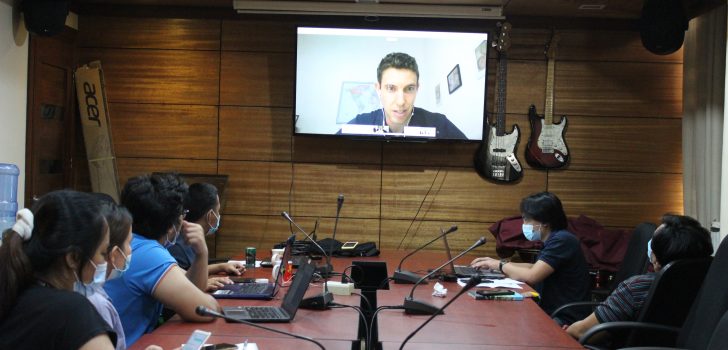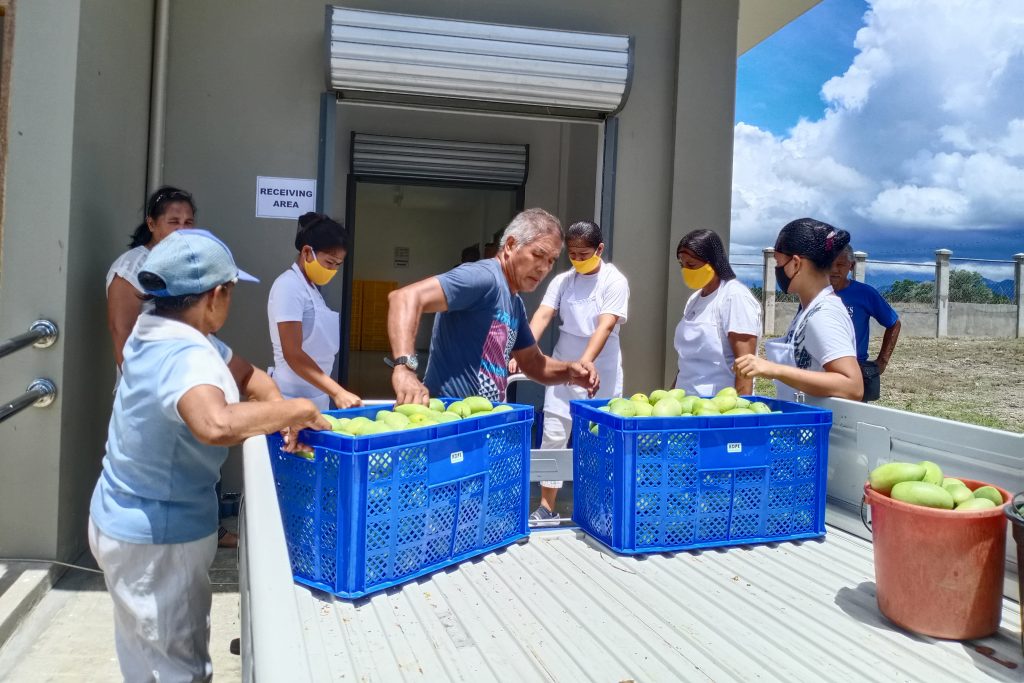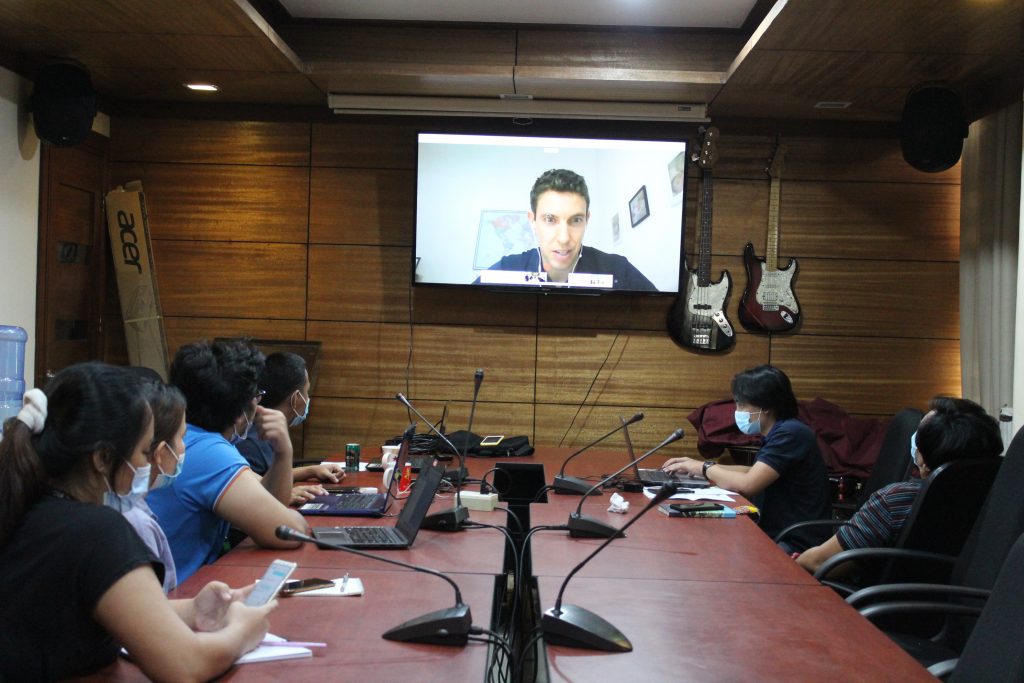 World Bank Senior Agriculture Economist and Task Team Leader Eli Weiss ending the South Luzon’s presentation for the I-REAP component after the discussion on the Mango Processing Facility and Marketing enterprise with the other World Bank consultants. (Photo by Leira Vic Colongon, DA-PRDP MIMAROPA RPCO InfoACE Unit)
World Bank Senior Agriculture Economist and Task Team Leader Eli Weiss ending the South Luzon’s presentation for the I-REAP component after the discussion on the Mango Processing Facility and Marketing enterprise with the other World Bank consultants. (Photo by Leira Vic Colongon, DA-PRDP MIMAROPA RPCO InfoACE Unit) Mango processing facility in Puerto Princesa deems ‘a promising enterprise’ by the WB
The Philippine Rural Development Project (PRDP) organized the Tenth World Bank (WB) Implementation Mission through a two-week virtual activity from June 15 – July 3, 2020. Due to travel restrictions brought by the COVID-19 pandemic, for the first time, the Bank evaluated PRDP’s subprojects all over the country and conducted consultations with its stakeholders via online platforms instead of actual site visits.
One subproject per component was presented by each cluster in a virtual tour using a 30-minute audio visual presentation (AVP). For the I-REAP component, the South Luzon cluster presented the Mango Processing Facility and Marketing subproject operated by the Tagumpay Agrarian Auto Savings Multi-Purpose Cooperative (TAAS MPC) and implemented by the Puerto Princesa City Project Management and Implementing Unit (CPMIU).
The AVP for the mango enterprise started by showing an aerial view of the processing center followed by a digitized map of the site location and production area, showing its distance to market outlets and other socio-economic services in the city.
The TAAS MPC was then introduced through a presentation of its profile, membership, accomplishments, and highlights of their experience in mango production. A footage of the facilities and equipment provided by the PRDP was also shown succeeded by a list of products of TAAS MPC including dried mango, mango jam, and mango nectar.
The step by step process of producing dried mangoes – from selection of raw materials to delivery of end product to market centers – was also presented. Each stage in the process flow was ensured to follow safety food standards and Social and Environmental Safeguards requirements.
When asked about the economic benefits of the enterprise, Gilbert Ballogan, Operations Manager of TAAS MPC, said that “it will provide employment opportunities and increase everyone’s income. Our processors now have jobs and our mango growers have additional earnings because we buy our raw materials from them.”
Mikhail Alcibar, a farmer-member, agreed with Ballogan and added that the cooperative also helped in reducing his expenses. “The distance of the farm is 1.5 kilometers from the processing center but I don’t need to spend for the transportation because the TAAS MPC picks up the mango produce here in our area using the hauling truck and they buy our products at the right price,” Alcibar said.
Although the current pandemic brought challenges to the operations of the processing facility such as delay in the delivery of some of the ingredients for dried mango that are coming from Metro Manila, Ballogan said that they adjust by increasing production quantity of other products like juices, instead of just dried mango, so that they can still process and sell to the local market.
Puerto Princesa City Agriculturist, Melissa Macasaet, then detailed the City’s collaboration with the United States Agency for International Development’s Strengthening Urban Resilience for Growth with Equity (USAID-SURGE) project which also includes assistance to the TAAS MPC.
“Since target markets are not present because of the current situation due to the COVID-19, then we will have to strengthen our digital marketing capabilities with the assistance of USAID-SURGE and all the other agencies for us to be able to market the dried mangoes and other products of the cooperative,” Macasaet explained.
“Ensure that the cooperative will be able to manage and operate the system well since the digital platform and marketing are key instruments to pursue [opportunities] and improve marketing [strategies] and this is not yet part of their capacity building,” WB Senior Rural Development Specialist and Co-Task Team Leader, Maria Theresa Quinones, recommended.
After the virtual tour, WB Rural Infrastructure Engineer, Raoul Asanza, gave his comment about the subproject and expressed that “the subproject is well constructed.”
Finally, Eli Weiss, WB Senior Agriculture Economist and Task Team Leader, ended the discussion by congratulating the South Luzon cluster, Puerto Princesa CPMIU, and TAAS MPC and noting the Mango Processing Facility and Marketing as “a promising enterprise”. ### (Leira Vic Colongon, DA-PRDP MIMAROPA RPCO InfoACE Unit)

TAAS MPC Operations Manager Gilbert Ballogan (center) assists in receiving the delivery of mango produce to the Mango Processing Facility and Marketing enterprise for processing into dried mangoes, mango jam, and mango nectar. (Photo by Puerto Princesa CPMIU)

World Bank Senior Agriculture Economist and Task Team Leader Eli Weiss ending the South Luzon’s presentation for the I-REAP component after the discussion on the Mango Processing Facility and Marketing enterprise with the other World Bank consultants. (Photo by Leira Vic Colongon, DA-PRDP MIMAROPA RPCO InfoACE Unit)
